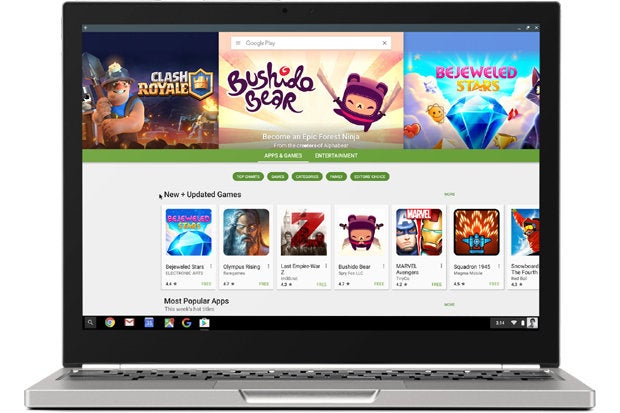Well, gang, it's actually happening: The full Google Play Store of Android apps is starting to show up on Chromebooks.
We first heard about the move during Google's I/O developers' conference last month. And while the ability to install Android apps won't be present for most Chromebook users until later this year, Google is now in the midst of making the function available on the advanced development channel of its Chrome OS operating system (only on the Asus Chromebook Flip at the moment but with other selected devices set to follow sometime "soon").
To be sure, this is an early and still-rough-around-the-edges version of the effort -- hence its appearance only on the Chrome OS development channel, which is designed for developers and early adopters to try out new features as they're being prepared. But still, I can't help but think lots of tech-loving folks are going to approach this new capability with expectations of immediate magic.
Let me go ahead and spoil it for you now: There isn't going to be any sort of amazing "ahah!" moment of wonder when you first encounter the Play Store on a Chrome OS device. More likely, there's going to be a feeling of: "Oh. That's it?" Because significant as the feature is -- and as we've discussed before, it absolutely is a big deal -- you have to look at it from a broader perspective if you want to appreciate its true importance.
Bringing Android apps onto Chromebooks is first and foremost about lessening a Chromebook's limitations. The biggest immediate benefit is that it'll let Chrome OS users perform tasks that are presently impossible on the platform -- things like accessing Microsoft's full suite of Office utilities, using fully featured image editors, and making and receiving video calls on Skype (something the company's Web app bafflingly doesn't allow).
These things certainly aren't magical in and of themselves -- because guess what? Running any given Android app on a Chromebook is pretty much the same as running it on an Android device. It isn't some wild new experience that's gonna blow your mind the second you try it.
What it is going to do, though, is make Chrome OS more versatile as a platform and thus more viable as a primary computing environment for more people -- people like me who mostly use Web apps but still have a handful of needs (like the occasional opening of a document with Microsoft's Track Changes formatting in place or the advanced editing of a multilayered image) that Web-based utilities can't readily address.
What's critical to remember is that this move is ultimately about blending two platforms together -- taking two familiar entities and allowing them to overlap in a way that benefits both. It's about expanding the usefulness of Chrome OS by bringing a piece of Android into its dimension -- and in doing so, broadening the platform's appeal and giving it a new level of life. That may not deliver the type of instant thrill new-feature-seekers hope to find, but at the end of the day, it'll pack a much more meaningful and far-reaching benefit.
Google certainly has its work cut out for it when it comes to making Android apps run smoothly on Chromebooks -- from getting developers to update their apps for full compatibility to figuring out a way to eliminate the confusion of having two overlapping app markets on a single device. What we're seeing now is only the beginning.
If the company manages to make this experience a good one, though, this seemingly mundane first step could mark the start of something transformative. You just have to step back and look at the big picture to grasp the scope of its significance.







